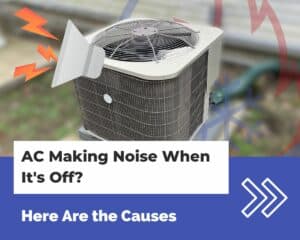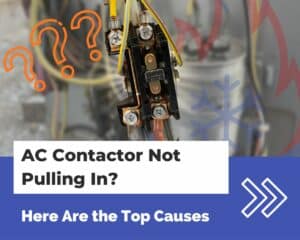Do you suspect that your AC has low refrigerant or freon?
There are several different symptoms of low refrigerant in your AC—and you’ll often see a few of them at the same time.
In this article, I’ll go over the 7 symptoms of low refrigerant in your AC.
I’ll also cover what you should do if you have low refrigerant in your AC.
The symptoms of low refrigerant in a central AC
The symptoms of low refrigerant in your AC show themselves in a variety of ways—from a frozen evaporator coil, all the way to a compressor that won’t turn on.
So how does an AC get low on refrigerant in the first place?
It’s important to understand that refrigerant doesn’t get “used up” when you run your AC.
If you have low refrigerant in your AC, there is a refrigerant leak somewhere in your system.
So how do you know for sure that you have low refrigerant in your AC?
Here are the 7 symptoms of low refrigerant in your AC:
- Frozen evaporator coil
- Frozen refrigerant suction line
- Warm air blowing from your vents
- Your AC runs much longer than normal
- Hissing noise coming from your AC
- The compressor has a low amp draw
- The compressor won’t turn on
I’ll go over them below.
Frozen evaporator coil
A frozen evaporator coil is a classic symptom of low refrigerant in an AC.
An AC evaporator coil normally stays at temperatures slightly above freezing.
But when your AC has low refrigerant, the evaporator coil temperature goes down below freezing.
However, a frozen evaporator coil can also be caused by low airflow through your AC system. So you’ll want to make sure that low refrigerant is the cause of the frozen coil before calling in an HVAC tech.
Check out my article below if your AC’s evaporator coil is frozen:
Frozen refrigerant suction line
A frozen suction line is a telltale sign of low refrigerant in your AC.
If you go outside and the line that connects to your AC is frozen, there’s a good chance that your AC is low on refrigerant.
However, a frozen AC line isn’t a guarantee that your AC is low on refrigerant.
A frozen AC line could also indicate low airflow or a refrigerant blockage in your AC system. So it’s worth checking for those things too.
For more information about frozen AC lines, check out my article below:
Warm air blowing from your vents
Warm air blowing out of your vents could mean that your AC is low on refrigerant.
If your AC unit outside is running but cold air isn’t coming out of your vents, your AC might be low on refrigerant.
However, warm air blowing from the vents isn’t a surefire sign that your AC is low on refrigerant—it could be caused by many other things as well.
For more information about an AC that isn’t blowing cold, check out my article below:
Your AC runs much longer than normal
If your AC runs much longer than it normally does, it might have low refrigerant.
Low refrigerant in an AC will reduce its cooling capacity.
This means that your AC will need to run for a much longer period of time to bring your home down to a comfortable temperature.
In some cases, your AC will run constantly as it tries to keep your home cool.
You might notice that your AC runs for longer and longer periods of time. And then eventually, it just stays running all the time. That’s a sign of a refrigerant leak and that your system is running low on refrigerant.
Hissing noise coming from your AC
A hissing noise coming from your AC is a telltale sign of a refrigerant leak in your AC system.
If you have a crack or hole in your AC’s refrigerant system, then it may emit a hissing noise as the refrigerant leaks out.
But don’t let the absence of a hissing noise make you think that there’s no refrigerant leak in your AC.
Many leaks are small enough that you won’t ever hear a noise.
The best way to confirm if you have a refrigerant leak in your AC is to spray a soapy water solution on the suspected area. If you see bubbles form after spraying the solution, then you’ve found the leak.
The compressor has a low amp draw
If you have low refrigerant in your AC, then its compressor will draw less amps than normal.
Measuring the amp draw of an AC compressor is a method used by AC technicians to diagnose issues with air conditioners.
If you have a clamp meter, then measuring a low amp draw from your AC compressor is one symptom of low refrigerant in your AC.
I should mention that a low amp draw alone is not a telltale sign of low refrigerant in your AC—some compressors may draw low amps even when operating normally.
That’s because the amp draw of a compressor depends on a multitude of factors—including refrigerant pressure.
But if your compressor is drawing a fraction of amps compared to what it normally does—that’s a sign that your AC is low on refrigerant.
The compressor won’t turn on
A compressor that refuses to turn on is a symptom of low refrigerant in your AC.
Why does low refrigerant prevent an AC compressor from turning on?
It’s all due to the pressure in the system.
When there is low refrigerant in your AC system, the refrigerant pressure will run low.
As a result of the low refrigerant pressure, the low pressure switch will trip and prevent your compressor from turning on.
The low pressure switch will reset itself when your AC’s refrigerant pressure returns to normal levels. But if your AC has low refrigerant that might not happen until your AC is fixed.
I’ll discuss what you should do when your AC has low refrigerant below.
What you should do when your AC has low refrigerant
If your AC has low refrigerant, you need to call an HVAC technician.
Unfortunately, recharging an AC with refrigerant cannot be done yourself. You’ll need an HVAC technician with a license/certification to add refrigerant to your AC.
Your HVAC technician will repair the refrigerant leak first, then recharge and recommission your AC system to get it working again.



